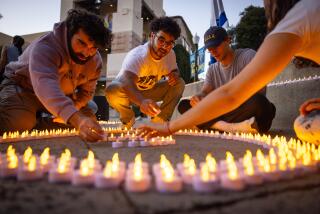Veterans of Soviet Army Recall Long, Harsh War
Wearing rows of aging medals on weary chests, hundreds of old soldiers from the Soviet army marched once more Tuesday--this time to a park in West Hollywood where they celebrated the end of World War II.
It was a bittersweet reunion for veterans of the Red army who suffered mightily to beat back Nazi Germany’s invasion of the Soviet Union, only to see it replaced with Cold War oppression that drove them from their homeland.
Since the mid-1970s about 13,000 Russian immigrants, mainly Jews, have settled into American lives in West Hollywood. But each May 9 many gather to remember the horrors of battle more than half a century ago and half a world away.
“I would never want anybody in the world to go through what we went through,” said Yefim Stolyarsky, 77. “I spent 1,100 days on the front, living for months in trenches. I was wounded twice. It was freezing in the winter, and there were days when we didn’t have anything to eat. There was nobody to bring us anything.”
Stolyarsky was an artillery captain on May 9, 1945, when the Soviets, Americans and other allies celebrated victory in Europe Day. He now heads the 670-member Los Angeles Assn. of Russian Veterans.
Efim Kurtz, also 77, is a co-founder of the group. He was a colonel in the Red army when his troops met American soldiers near the River Elbe. He remembers the well-equipped U.S. troops resembling angels to the poorly outfitted Soviets.
The Soviet army was so badly depleted by the end of the war that women and boys made up about a third of the Soviet military, according to experts. Twenty million Soviets, military and civilians, died in the war.
“I was 12 when I went into the army,” said Grisha Achoian, who wore an aging olive green uniform decorated with 41 medals to Tuesday’s ceremony. Now 74, Achoian rose to be a Soviet major. “I wanted to go to war. My mother and father had died. I wanted to help protect my country.”
Standing next to him was Yevgeniy Rykov, 77. He was wearing a white sailor’s uniform bearing medals that reflected his bravery in the Balkans and in the Battle of Leningrad. From his pocket he pulled a faded photograph of the battleship Kirov. That’s where he was injured when it struck a mine and then was shelled in the Baltic Sea.
Torkom Pailevanian, 78, nodded knowingly at the mention of war wounds. He was a Red army sergeant when he was hit twice by mortar shell fragments in the Battle of Dresden.
“It was a bad war, with too many people dying,” Pailevanian said. “But we stayed alive. I invaded Berlin. There were no streets, no buildings, no nothing when we got there. People came out with white flags. They were scared of us. But we didn’t touch them. We didn’t touch anything: Those were our orders.”
A murmur went through the crowd of nearly 1,000 at Plummer Park when a restored 1942 Jeep driven by Odessa-born Leonid Derbarmdiker pulled to a stop in front of the ceremony’s stage. He had painted the words “On to Berlin” in Russian across its olive drab front. A red Soviet flag fluttered on its fender--more of a tribute to a moment in time than to a now defunct nation from which they fled.
Those in the crowd dabbed at their eyes as 75-year-old Roza Nemirovskaya took the stage to tell of being liberated from a Nazi concentration camp by Soviet soldiers.
They applauded as 79-year-old Abram Okopnik thanked the United States for saving lives by delivering food to Russians during the two-year Leningrad blockade and then by opening its doors to Russian Jews 30 years later.
“We’ll never forget that help. Take a look at the U.S., at the freedom we have here. We’re former enemies who today are breathing the freedom of American air,” said Okopnik, who was a Soviet sailor in World War II.
Los Angeles County Sheriff Lee Baca, West Hollywood Mayor Jeffrey Prang and Councilman Steve Martin were among those praising the Soviet veterans. U.S. war veteran Odas L. Flake made a point of acknowledging the scores of women in the crowd with war medals pinned to their blouses and dresses.
“Thank you for what you did. God bless you ladies,” Flake said, stepping down from the stage to present a bouquet of flowers to a woman in the front of the crowd wearing more than a dozen medals.
The mood changed from solemn to joyful as the ceremony drew to a close and singers Lisa Shumim, 69, originally from Moscow, and Boris Rapport, 52, from Kiev, took the stage. Mournful ballads gave way to Russian love songs.
Medal-bedecked Dora Nudel, 70, and Bzonya Kzylovetskay, 77, grabbed the arms of two old soldiers and started dancing.
Once again, the Red army was showing its resilience.
More to Read
Sign up for Essential California
The most important California stories and recommendations in your inbox every morning.
You may occasionally receive promotional content from the Los Angeles Times.











